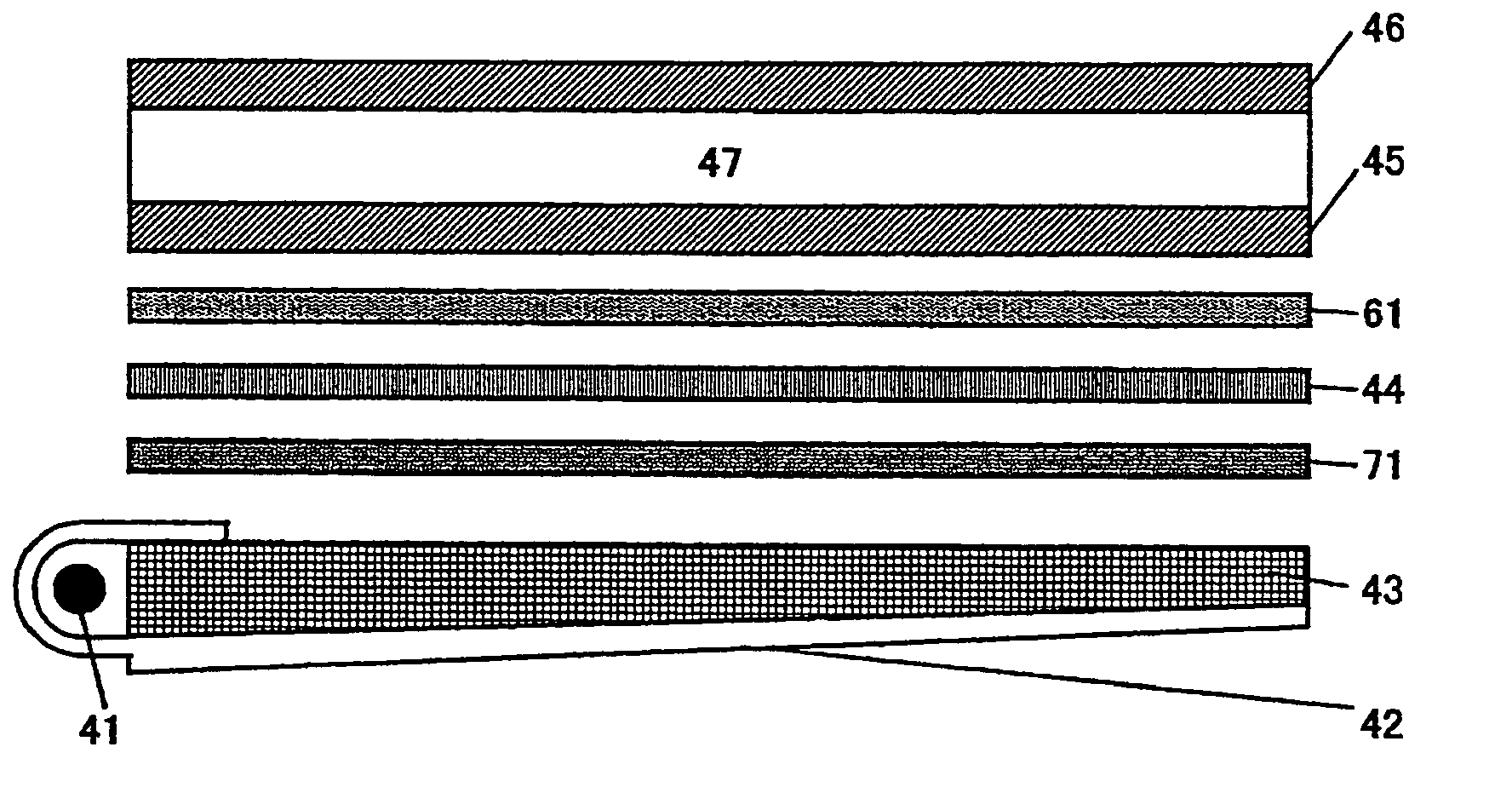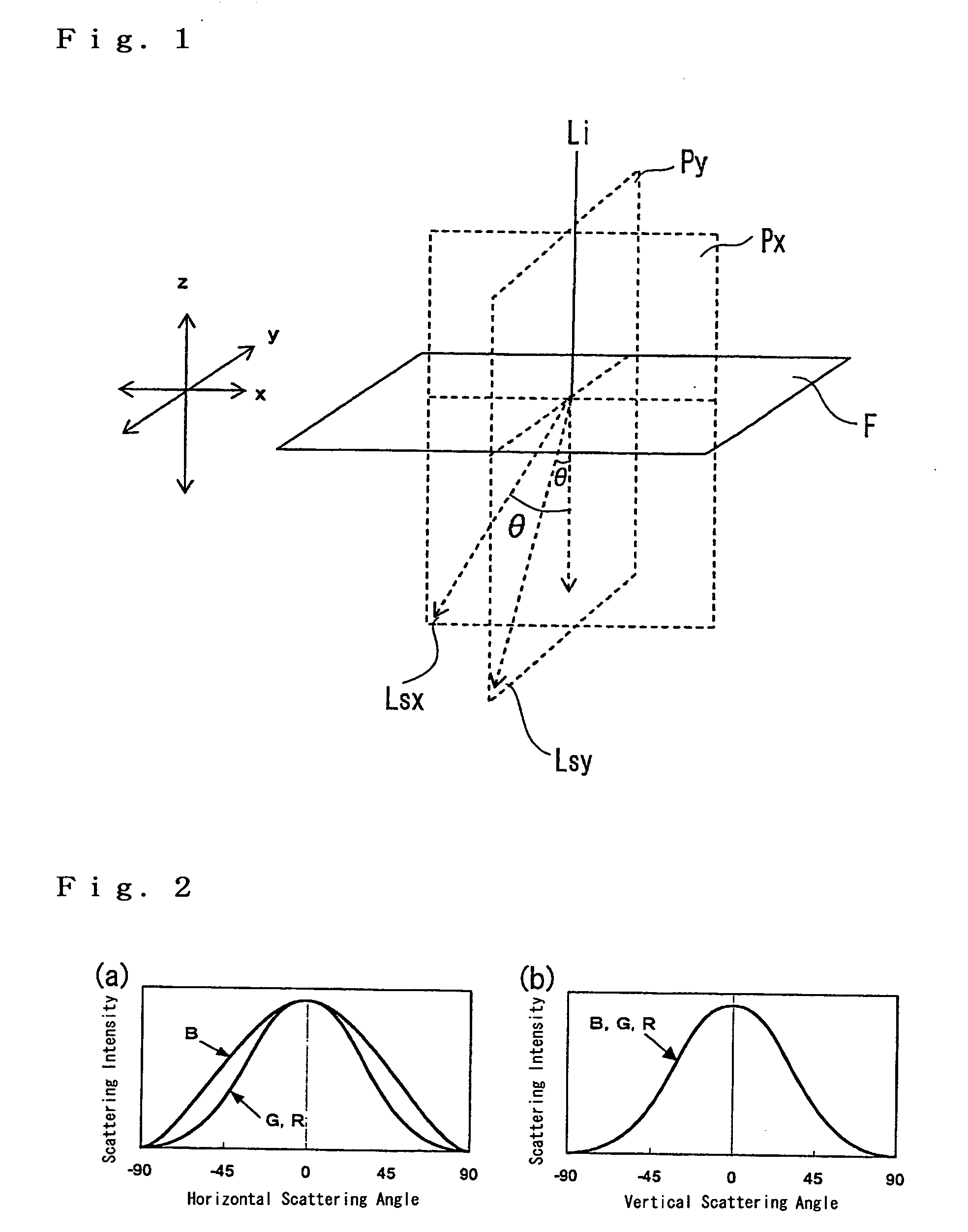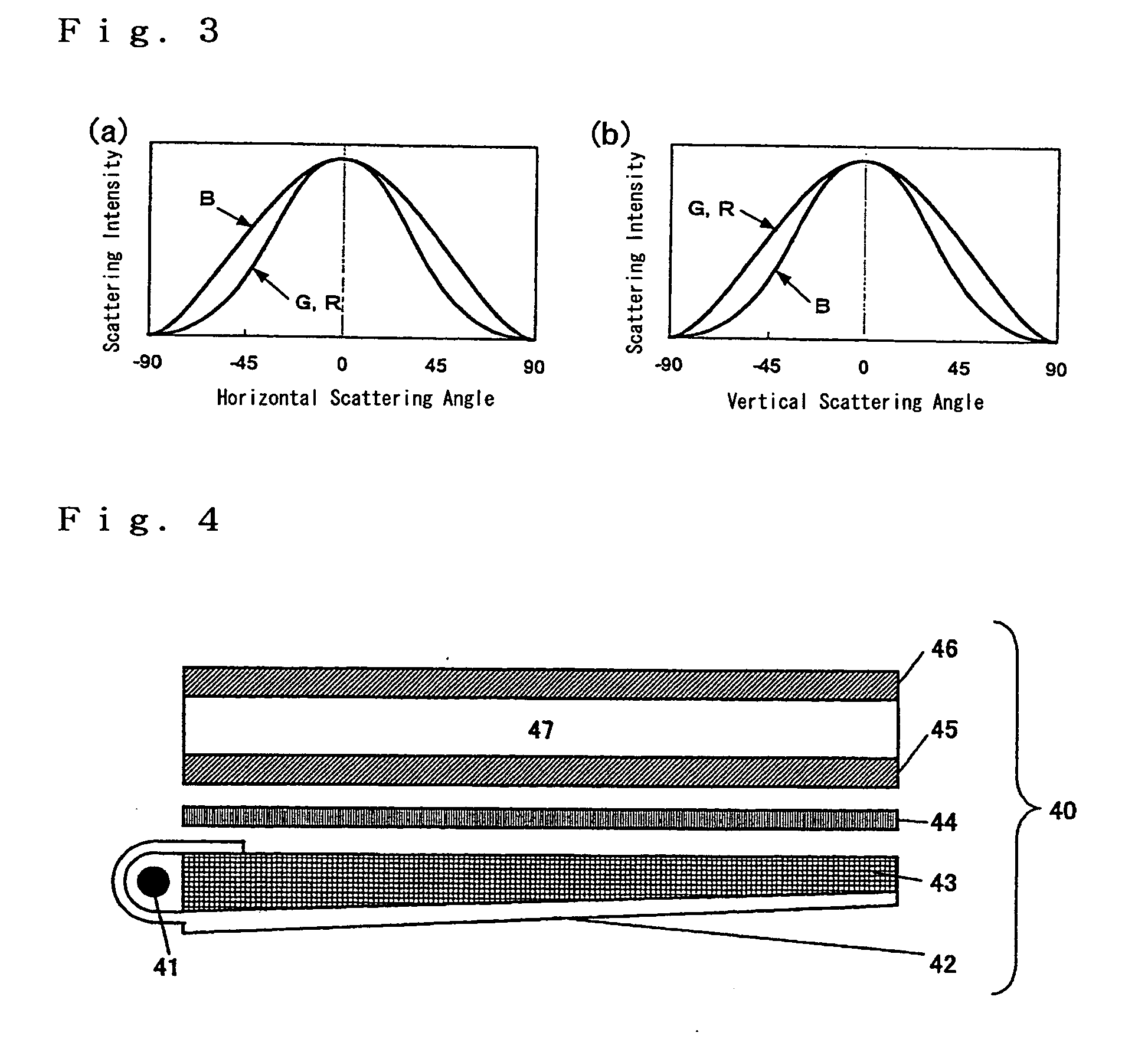Anisotropic spectral scattering films, polarizers and liquid crystal displays
a polarizer and anisotropic spectral scattering technology, applied in the direction of instruments, optical waveguide light guides, optical light guides, etc., can solve the problems of low power consumption, the viewing angle characteristics of liquid crystal displays cannot exceed those of crts, and the stn liquid crystal displays using liquid crystal molecules with a twist angle of 180-270° cannot achieve high black and white contrast, etc., to achieve excellent color compensation function improve color viewing angle characteristics
- Summary
- Abstract
- Description
- Claims
- Application Information
AI Technical Summary
Benefits of technology
Problems solved by technology
Method used
Image
Examples
first embodiment
As used herein, the term “anisotropic spectral scattering film” means a film characterized by different scattered light distributions at two wavelengths arbitrarily selected from 435 nm (B) , 545 nm (G) and 610 nm (R) as well as different scattered light distributions between two scattering planes orthogonal to each other. an anisotropic spectral scattering film of the present invention is characterized in that the scattered light intensity Fx(λ,θ) at azimuthal angle θ and incident wavelength λ in an arbitrary scattering plane with respect to the film surface and the scattered light intensity Fy(λ, θ) at azimuthal angle θ and incident wavelength λ in a scattering plane orthogonal to said scattering plane satisfy the following equations (1) and (2):
Fx(λ, θ) / Fx(545, θ)≧1.2 (1)
{Fx(λ, θ) / Fx(545, θ)−Fy(λ, θ) / Fy(545, θ)}≧0.1 (2)
provided that λ is 435 or 610 nm and θ is an arbitrary angle selected from 30 to 70°.
second embodiment
an anisotropic spectral scattering film of the present invention is characterized in that said Fx(λ, θ) and Fy(λ, θ) satisfy the following equation (3):
{Fx(λ, θ)) / Fx(545, θ)−1}{Fy(λ, θ) / Fy(545, θ)−1}<0. (3)
The wavelengths 435 nm, 545 nm and 610 nm are typical of B, G and R, respectively. In the present invention, the wavelength λ may be within a tolerance of ±10 nm.
In equation (1) above, Fx(80 , θ) / Fx(545, θ) is preferably 1.2 to 5.0, more preferably 1.5 to 3.5. In equation (2) above, {Fx(λ, θ) / Fx(545, θ) −Fy(λ, θ) / Fy(545, θ)} is preferably 0.1 to 5.0, more preferably 0.5 to 3.0. In equation (3) above, {Fx(λ, θ) / Fx(545, θ)−1}{Fy(λ, θ)) / Fy(545, θ)−1} is preferably −5.0 to −0.1, more preferably −3.0 to −0.3.
Referring to FIG. 1, a method for evaluating the wavelength dependency and anisotropy of the scattered light distribution of a film is explained.
Light Li at wavelength λ is incident on film F from above. The incident light Li is scattered into various directions (e.g...
examples
The following examples further illustrate the present invention. The materials, reagents, amounts and proportions thereof, procedures or the like shown in the following examples can be appropriately changed without departing from the spirit of the present invention. Therefore, the scope of the present invention is not limited to the specific examples shown below.
(Preparation of an Anisotropic Spectral Scattering Film AS-1)
A holographic photopolymer (OmniDex HRF-352 from DuPont) was spin-coated to a thickness of 9 μm on a polyethylene terephthalate film and exposed to a two-beam interference system at a dose of 75 mJ / cm2 using an argon laser at 488 nm. Then, the coating film was irradiated with UV light at an irradiance of 400 mW / cm2 and a dose of 300 mJ / cm2 using a 160 W / cm air-cooled metal halide lamp (from Eye Graphics Co., Ltd.) and then dried at 100° C. for 1 hour to prepare an anisotropic spectral scattering film AS-1 based on a one-dimensional diffraction grating.
(Prepa...
PUM
| Property | Measurement | Unit |
|---|---|---|
| refractive index | aaaaa | aaaaa |
| refractive index | aaaaa | aaaaa |
| twist angle | aaaaa | aaaaa |
Abstract
Description
Claims
Application Information
 Login to View More
Login to View More - R&D
- Intellectual Property
- Life Sciences
- Materials
- Tech Scout
- Unparalleled Data Quality
- Higher Quality Content
- 60% Fewer Hallucinations
Browse by: Latest US Patents, China's latest patents, Technical Efficacy Thesaurus, Application Domain, Technology Topic, Popular Technical Reports.
© 2025 PatSnap. All rights reserved.Legal|Privacy policy|Modern Slavery Act Transparency Statement|Sitemap|About US| Contact US: help@patsnap.com



